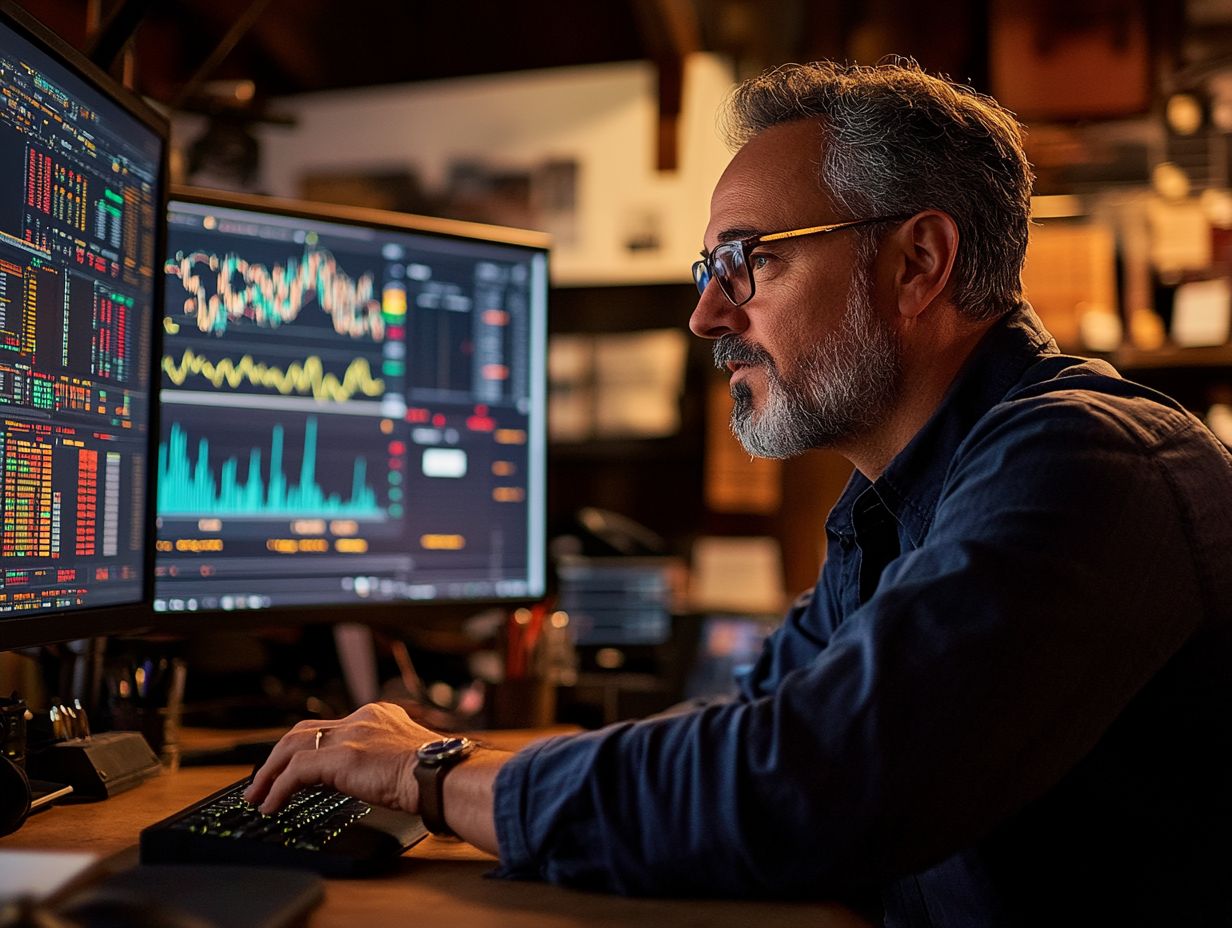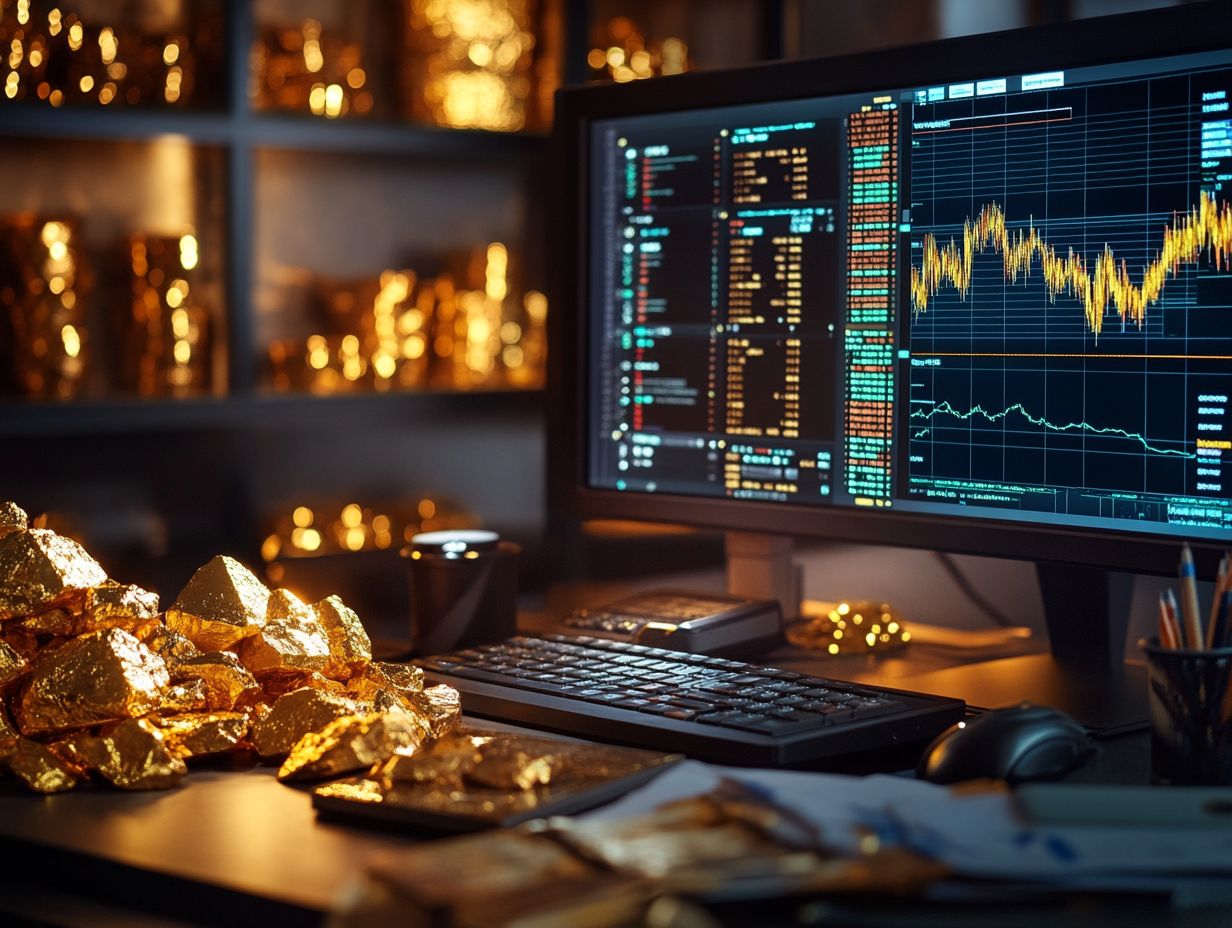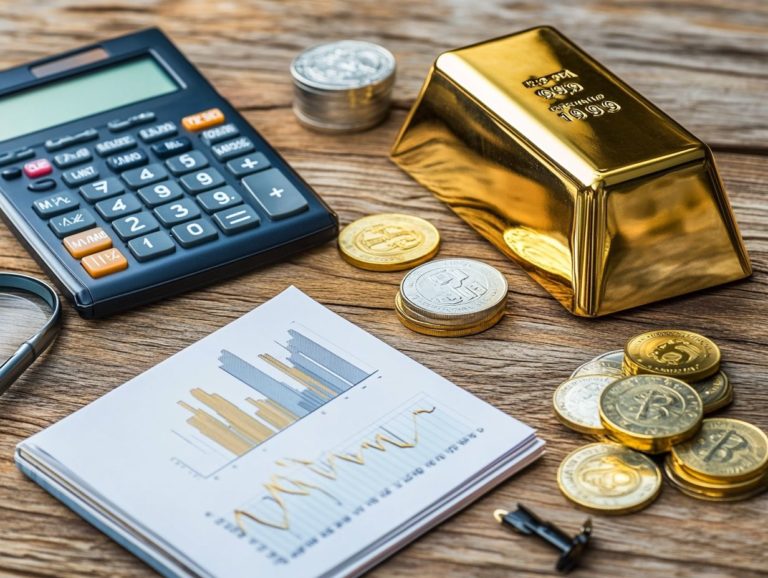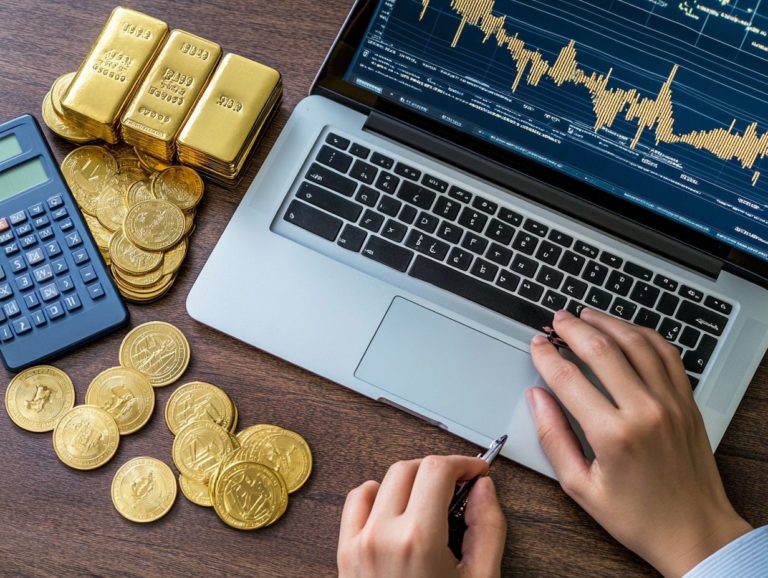How to Manage Emotions in Precious Metals Trading
Trading in precious metals can be both exhilarating and emotionally taxing. It’s essential for you to grasp the psychology behind trading, as emotions often steer your decisions, occasionally resulting in costly mistakes.
This exploration delves into the complex relationship between emotions and trading, offering you practical techniques for emotional management, such as mindfulness and self-awareness.
It also presents tailored strategies for precious metals trading, including the importance of setting realistic expectations and crafting a solid trading plan.
It also discusses when you might need to seek professional help. Embrace your journey toward more mindful trading and uncover methods to keep your emotions in check, paving the way for greater success.
Contents
- Key Takeaways:
- The Psychology of Trading
- Emotional Management Techniques
- Practical Tips for Managing Emotions in Precious Metals Trading
- Seeking Professional Help
- Frequently Asked Questions
- How to Manage Emotions in Precious Metals Trading?
- Why is it important to manage emotions in precious metals trading?
- What are some common emotions experienced in precious metals trading?
- How can fear impact precious metals trading?
- What strategies can help manage emotions in precious metals trading?
- How can keeping a trading journal help in managing emotions?
Key Takeaways:

Remember, mastering your emotions is the key to successful trading!
The Psychology of Trading
The psychology of trading explores the nuanced relationship between emotions and choices about investing, uncovering how thoughts and feelings such as fear, greed, and hope shape your behavior in the financial markets.
Grasping this complex interplay is essential for you as an investor, enabling you to manage your emotions effectively, deal with changes in the market, and craft trading strategies that resonate with your rules for managing risk in your investments.
By identifying the emotional triggers that may lead to irrational choices, you can greatly enhance your performance outcomes in the stock market and other financial realms.
Understanding Emotions in Trading
Understanding emotions in trading is essential for achieving success. Feelings like fear, greed, and regret can significantly cloud your decision-making and lead to poor investment choices.
You often find yourself dealing with changes in the market that can trigger intense emotional responses. It s crucial to recognize how these feelings shape your behavior. For example, fear might push you into an irrational frenzy to sell when stock prices dip, while greed could tempt you into overexposure during a rising market, setting the stage for risky investments.
Emotional control is key to mitigating these tendencies, enabling you to adhere to your strategies and make rational decisions, even when the market gets turbulent. By building a calm mindset now to make better decisions and employing techniques like mindfulness, you can enhance your decision-making processes and ultimately boost your chances of financial success. Additionally, understanding how to store precious metals can also play a significant role in your investment strategy.
Emotional Management Techniques
Emotional management techniques are vital for you as a trader aiming to maintain emotional control. By understanding and navigating the thoughts and feelings that influence your trading behavior, you can significantly enhance your performance metrics in the financial markets.
Mindfulness and Self-Awareness

Mindfulness and self-awareness are invaluable tools for you as a trader, enabling you to cultivate emotional control and elevate your trading psychology.
By practicing mindfulness, you can sharpen your awareness of your thoughts and feelings while trading, giving you the ability to pause and evaluate your emotional triggers before succumbing to impulsive decisions. This self-awareness is essential for recognizing the biases that can cloud your judgment, like the fear of loss or that pesky overconfidence that follows a winning streak. Additionally, being informed about how to liquidate precious metals can further enhance your trading strategy.
As a result, you can approach your trading strategies with a clearer mindset, making decisions rooted in analysis rather than in fleeting emotions. By intentionally focusing on this practice, you can forge a more disciplined and resilient approach, ultimately paving the way for consistent trading success and enhanced performance in the market. Additionally, if you’re considering investing in precious metals, it’s important to know the best vaults for storing precious metals to ensure your assets are secure.
Strategies for Handling Emotions
Implementing effective strategies for managing emotions is crucial for you as a trader. It helps you maintain discipline, minimize emotional biases, and stick to your trading plans, even when the market gets turbulent.
To achieve this, consider developing a comprehensive trading plan that outlines specific entry and exit points, along with clear risk management techniques like setting stop-loss orders. Additionally, learning how to minimize tax liabilities on precious metals can enhance your overall strategy. This structured approach allows you to concentrate on your plan rather than being swayed by fleeting emotions during unexpected market shifts.
Cultivating emotional awareness will foster the discipline you need to adhere to your plans, even in stressful situations. Prioritizing these strategies boosts your chances for success and lays the groundwork for a sustainable trading career based on rational decision-making, especially when you understand precious metal trends over time.
Practical Tips for Managing Emotions in Precious Metals Trading
Managing your emotions in precious metals trading demands insightful tips and strategies tailored to help you navigate the distinct market dynamics of assets like gold and silver.
By implementing these approaches, you can ensure that your trading strategies remain robust and resilient against emotional influences.
Setting Realistic Expectations
Setting realistic expectations is essential for you as a trader, as it enables you to maintain emotional control and measure your success against realistic goals.
When you step into the realm of precious metals trading, grasping the significance of mapping out feasible goals is paramount. This thoughtful planning minimizes impulsive decisions fueled by greed or fear and cultivates a sense of accomplishment as you achieve incremental successes. To enhance your strategy, consider following the best practices for precious metals investment.
By framing your ambitions within practical limits, you create a structured approach that enables you to navigate market fluctuations more effectively. This reduces anxiety and fosters resilience in the face of inevitable setbacks.
Ultimately, adopting this disciplined mindset can lead to improved trading outcomes and a more rewarding experience in the dynamic world of precious metals.
Developing and Sticking to a Trading Plan

Developing and adhering to a trading plan is essential for effective trading, as it cultivates discipline and enhances your ability to manage emotions during market fluctuations.
A comprehensive trading plan not only specifies your entry and exit strategies but also incorporates risk management parameters that can significantly help you maintain your composure. By setting predetermined risk levels, you can systematically mitigate potential losses, easing any anxiety during volatile periods.
This clear framework enables you to concentrate on executing your trades rather than being swayed by the unpredictable emotions of the market. This structured approach leads to more consistent decision-making, enabling you to stay true to your strategy and increasing your chances of achieving long-term success.
Utilizing Risk Management Strategies
Utilizing risk management strategies is essential for you to maintain emotional control and effectively navigate the uncertainties of the financial markets.
By implementing techniques such as position sizing (determining how much of your capital to risk on a single trade), setting stop-loss orders, and diversifying your portfolio, you can minimize potential losses while gaining confidence in your decision-making processes.
Developing a well-defined trading plan will help you avoid impulsive reactions driven by market fluctuations. The discipline to stick to your predefined risk parameters becomes particularly crucial during volatile periods when emotions can easily cloud your judgment.
Incorporating tools like risk-reward ratios allows you to assess the viability of your trades, ensuring that you make informed choices that align perfectly with your financial goals.
Seeking Professional Help
Don’t miss out on a transformative step in your trading journey; seeking professional help can change everything for you as a trader grappling with emotional management.
Therapy and counseling provide invaluable insights into trader psychology, equipping you with effective coping mechanisms to navigate emotional challenges.
Embracing this support can significantly enhance your trading experience and overall well-being.
When to Consider Therapy or Counseling
Understanding when to seek therapy or counseling is essential for traders facing emotional challenges that affect their performance and decision-making.
Recognizing the signs that indicate you could benefit from professional support can profoundly influence your trading journey. Persistent anxiety, impulsive trading decisions, and difficulty maintaining focus often signal deeper emotional struggles. If you notice a consistent drop in your performance metrics, like rising loss ratios or a failure to stick to your strategies, it may be time to consider intervention. Additionally, understanding how to trade precious metals can also provide valuable insights into improving your trading approach.
Connecting these emotional hurdles to tangible outcomes can help you realize that seeking guidance isn t a sign of weakness; it s a strategic move toward improving your mental well-being and enhancing your trading effectiveness.
Frequently Asked Questions
How to Manage Emotions in Precious Metals Trading?
Managing emotions in precious metals trading is essential for success in this volatile market. Here are some tips to help you keep your emotions in check:
Why is it important to manage emotions in precious metals trading?
The precious metals market is highly volatile and can be influenced by various external factors. Emotions such as fear and greed can cloud your judgment and lead to impulsive, irrational decisions that result in losses. It s crucial to manage emotions to make well-informed trading decisions.
What are some common emotions experienced in precious metals trading?
Fear, greed, hope, and regret are some common emotions experienced in this trading environment. These feelings can lead traders to make impulsive decisions that harm their trading strategy.
How can fear impact precious metals trading?
Fear is a natural human emotion and plays a significant role in precious metals trading. The fear of missing out on profitable trades can lead traders to take unnecessary risks, while the fear of losing can cause them to hold onto losing positions for too long. Both scenarios can result in significant losses.
What strategies can help manage emotions in precious metals trading?
Developing a trading plan and setting realistic goals are crucial for managing emotions. Stick to your plan and practice risk management to protect your investments. Having a contingency plan is essential in case things do not go as expected.
How can keeping a trading journal help in managing emotions?
Keeping a trading journal allows traders to identify patterns in their emotions and behavior, leading to necessary adjustments. It can also serve as a learning tool, helping traders avoid repeating past mistakes driven by emotions.
Take the next step: reach out to a therapist or trading coach to enhance your emotional resilience. Your trading journey can be significantly improved with the right support!















